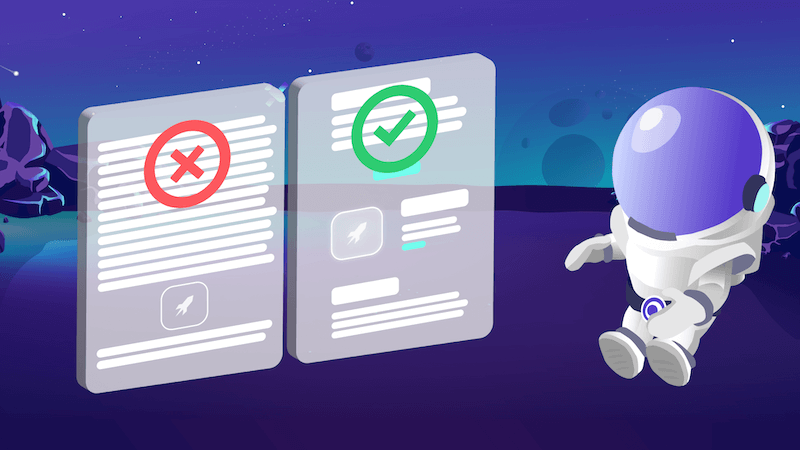SearchGPT/ChatGPT Search has arrived and SEO is dead.
At least that is the impression you can easily get if you navigate on social media platforms like LinkedIn.
SEO is alive, and Google is alive and is still the big dog in the room, but with SearchGPT’s arrival the questions about how to get to rank in SearchGPT results, what the ranking factors for SearchGPT is and simply how to get visibility from SearchGPT.
That is exactly what we are going to investigate in this post to make you able to prepare to get a piece of the AI search engine-cake as the usage of AI search engines increases.
Grab a coffee, put on your best reading glasses and let’s get to it – or skip this whole post and start tracking ChatGPT mentions in the tool.
Key takeaways / TL;DR
- SearchGPT overview: An AI-driven search engine powered by Bing, delivering real-time, conversational answers.
- SEO’s relevance: SEO remains critical; high-quality content, user experience, structure and authority are key for SearchGPT visibility.
- Adaptation required: Optimize for natural language, user intent, and comprehensive, structured content to succeed in AI search (as classic SEO).
- SEO is still SEO: Ranking in LLM’s is basically the same as classic SEO. Rank in Bing to rank in AI/LLM engines.
What is SearchGPT? (ChatGPT Search)
SearchGPT is an AI-powered search engine delivering real-time, conversational answers.
For you as an SEO, SearchGPT is a new platform to optimize for, focusing on conversational content and user intent.
if it’s gone unnoticed: OpenAI have launched a new Search engine – an AI powered search engine – called SearchGPT or ChatGPT Search that is powered by Bing’s Index.
SearchGPT is an advanced AI tool built to deliver accurate, real-time answers by combining powerful search capabilities with conversational AI. Unlike regular search engines, it pulls live data from the web and provides relevant, up-to-date insights tailored to your query. It’s designed to make finding information faster, smarter, and more precise.
The underlying search engine data is from Microsoft Bing, which opens up for speculations if good Bing rankings also result in more SearchGPT visibility and mentions?
It’s very likely the case and what the early experiences show.
ℹ️ Read more about SearchGPT here.
What is SEO?
SEO is short for Search Engine Optimization and is the process of improving a website’s visibility on search engines to attract more organic traffic. SEO is about optimizing content, keywords, off-page signals and technical elements to rank higher in search results, helping businesses connect with their audience and grow online.
In simpler terms, SEO is all the effort you put into your website to make it highly relevant and accessible for specific search queries.
Think of it like managing a store.
As an SEO specialist, your role resembles that of a store manager. Imagine walking into a well-organized shop: the exterior is appealing, the layout inside is intuitive, and everything is exactly where it should be. For instance, all the milk is neatly grouped in one aisle, cereals are in another, and you won’t find bicycles parked among the bread.
Your job is to keep the “store” clean and attractive, ensuring products (your website content) are displayed in a way that makes sense to your visitors. Nothing feels chaotic or thrown together. Instead, it’s easy to find what you need, whether you’re a casual browser or a determined shopper.
Beyond presentation, your “staff” (your website’s functionality and user experience) is friendly, knowledgeable, and efficient. The checkout process (your call-to-action or conversion points) is seamless, so customers leave with exactly what they wanted—quickly and without frustration.
Happy customers leave your store with a positive impression, talk about it to others (backlinks), and bring in even more visitors. Over time, this growing popularity signals to search engines that your “store” is worth visiting, helping it rank higher and attract even more organic traffic.
What is SearchGPT SEO (or GEO)?

SEO for SearchGPT is basically the same as classic SEO just specifically targeted visibility in the ChatGPT Search feature. It requires the same focus on high-quality content, good user experience, link building and more.
You could argue that SEO for SearchGPT is more like “GEO” (Generative Engine Optimization) for AI search engines as ChatGPT Search, Google Gemini, Perplexity, Microsoft Copilot, etc.
I’ve heard quite a few new words and abbreviations about SEO for AI powered search engines: AIO, LLMO, GEO, AI SEO… And the list goes on.
But for the ease of it we’ll just call it SEO for AI search engines as we call it SEO for Google, Bing and any other search engine.
Will SEO be less relevant with SearchGPT?
No, SEO remains essential. SearchGPT evaluates content based on relevance, authority, and user intent, just like traditional engines. SEO will develop, focusing on conversational language, deep content, and optimizing for AI-driven user experiences.
For marketers and SEOs, SEO will remain an important channel and marketing discipline to be visible in AI search as well as classic search.
Search engines comes, search engines go, search engines change and so do marketing.
Most forecasts and predictions shows that SearchGPT will take bigger chunks of the total search market than Bing, Yandex, Yahoo and all the others have been able to in the competition with Google.
Just look at our own predictions of the growth in AI Search that shows quite a lot bigger market share than any other search engine today except Google.

If SearchGPT is able to take, say, 20% of the total search market it won’t make SEO unnecessary at all.
It’s a misconception that SEO is something solely Google related.
SEO is short for Search Engine Optimization and applies for Google as well as Bing, Yahoo and SearchGPT.
SEO will be as important as today if not even more because of the large parts of informational searches that will be moved to and covered by SearchGPT.
This makes it even more important to rank for your money keywords in Google as informational search-traffic will without doubt decline from Google over the years.
And what then? Then SEO won’t be as relevant anymore?
Wrong.
SEO for SearchGPT will be just one more search engine to optimize for meanwhile the importance of SEO remains.
Why SEO is still a thing with SearchGPT
SEO is still a thing with ChatGPT, as they heavily rely on the Bing Search Index that is a classic search engine.
For you working in marketing, SEO is still a thing, if you aim to get visibility in ChatGPT Search.
SEO is what makes your content get found. Just like Google, SearchGPT will detect well optimized content and show it to the users searching for information that you provide.
A part of SEO is also knowing what people search for, what questions they ask and what answers they want. By creating content that gives the right answers to the right people your chances of getting mentioned in SearchGPT increased a lot. Basically, it’s the same as Google SEO: Search engines will find the results that matches the user intent.
Next, we have the structured data with Schema Markup. This doesn’t only help Google understand your content better, but also other search engines as Bing and therefore SearchGPT.
High-quality content and great user experienced remains as a top factor for rank – also in SearchGPT. Better content is always a winner and user experience will apply for SearchGPT results as well as Google due to their focus on valuable and authoritative websites.
Therefore, SEO will remain just as important in the future with SearchGPT as it is and have been with Google. SEO is what gets you visibility in any search engine.
SearchGPT ranking signals

Now to the part that made you read this post. The ranking factors of SearchGPT.
SearchGPT’s ranking factors prioritize relevance, authority, user intent, and conversational clarity.
For you as an SEO professional, SearchGPT’s ranking factors demand high-quality, intent-driven, conversational content.
First of all you need to know that SearchGPT is build to use different sources to give you an answer.
SearchGPT prioritize “trusted sources” based on authority and relevance. So, how do they determine that?
They do that by using Bing’s web index to prioritize relevant and authoritative websites. Roughly speaking, you could say that SearchGPT is powered by Bing’s web index with ChatGPT’s capabilities on top to give you the direct conversational answer.
Now is the time to dust off your old Bing Webmaster Tools and get started optimizing for Bing Search if you aim for getting more visibility in SearchGPT.
The ranking factors for SearchGPT, Google, Bing, etc. isn’t radically different. In other words, there is not huge change in how SEO works.
SearchGPT visibility is a lot of the same as doing SEO towards Google – of course, there are differences especially in terms of weighing the importance of ranking factors compared to Bing.
From the early signs it seems that the following elements are parts of the ranking factors for SearchGPT:
1. Content relevance and contextual understanding
SearchGPT relies heavily on semantic understanding, making relevance and context the foundation of ranking. The AI analyzes how well the content aligns with the user’s query or question, not just through keywords but also by interpreting their underlying intent.
- Natural language phrasing: Content must be written in a conversational tone, mirroring how users phrase their queries.
- Contextual clarity: AI favors content that provides nuanced answers, explaining concepts thoroughly while adapting to the topic’s scope.
- Long-tail optimization: Queries in SearchGPT are often longer and more specific; targeting these can enhance discoverability – which also leads back to creating content in a conversational manner.
2. Depth and breadth of information
Unlike traditional search engines that may favor concise answers, SearchGPT prioritizes depth and breadth of knowledge within the content.
- Comprehensive coverage: Detailed explanations and well-structured articles covering multiple facets of a topic perform better.
- Subtopics and FAQs: Including relevant subtopics or frequently asked questions allows the AI to extract precise answers for diverse user intents.
- Authoritative insights: SearchGPT gives preference to content that reflects expertise, demonstrating authority on the subject matter. At least that is what they try to do. Bias can affect answers. If everyone is putting out wrong information, it’s likely that SearchGPT will too.
3. User engagement signals
Although SearchGPT doesn’t rely on direct user click-through rates (CTR) or bounce rates, it simulates engagement metrics by predicting which content best answers the user’s intent.
- Clarity and simplicity: Easy-to-understand content that avoids jargon often ranks higher.
- Actionable content: Guides, tutorials, and step-by-step instructions tend to engage users longer, which the AI recognizes as a valuable response.
- Conversational flow: Content structured to anticipate follow-up questions improves the user experience and ranks better.
4. Content freshness
SearchGPT values up-to-date information, especially for dynamic topics like news, trends, or regulatory updates. ChatGPT relies on training data and available information, hence up-to-date information is crucial to rank for anything news related – with ChatGPT Search they will access the internet for sources by using Bing’s Index.
- Recent content updates: Regularly updating articles to include the latest insights helps you stay relevant and increase your chances of mentions in SearchGPT.
5. Structured data and accessibility
AI search engines like SearchGPT benefit from well-organized and accessible content that can be easily parsed and understood.
- Structured headings (H1, H2, H3): Clear headings improve the content’s scannability and make it easier for AI to retrieve specific information.
- Bullet points and numbered lists: These make content digestible and suitable for summarization.
- Readable language: Content designed for broad comprehension, typically targeting an 8th-10th grade reading level, performs well. Content needs to be easy to understand and written in a conversational language.
6. Authority and credibility
SearchGPT prioritizes content from authoritative and credible sources. Bing Search Index is a part of the authority validation.
- Citations and sources: Linking to credible, high-authority sources improves content trustworthiness.
- Domain expertise: AI recognizes specialized knowledge, giving preference to niche experts.
7. Conversational search features
SearchGPT prioritizes content optimized for AI’s ability to hold a conversational thread and predict related queries.
- Follow-up questions optimization: Anticipating and answering potential follow-up queries enhances chances of being mentioned in SearchGPT.
- Persona adaptation: Aligning content tone and depth with specific user personas (e.g., beginners vs. experts) improves performance.
- Voice search: AI output is conversational. Focus on optimizing your content to fit the way people speak in a natural language.
8. Technical SEO for AI
While technical SEO for SearchGPT is less about indexing and more about accessibility, certain factors still matter – especially when we take into account that Bing Search Index is a part of the equation.
- Fast loading times: AI prioritizes well-optimized pages that provide instant access to content.
- Mobile optimization: With a significant portion of AI search happening on mobile devices, mobile-friendly content is critical.
- Meta descriptions: Well-written meta descriptions help AI contextualize page content for better matches to queries.
9. Bing
The most important thing to get visibility in ChatGPT Search is to rank in Bing. This means that you basically needs to optimize for Bing to be visible in ChatGPT Search as well as Perplexity.
The above factors will help you rank in Bing. When you rank in Bing you need to consider the above regarding content and language to optimize and help LLM’s to create output, hence your content can be optimized by focusing on conversational and natural dialogue.
How to rank in SearchGPT / ChatGPT Search

Ranking or gaining visibility in SearchGPT requires an approach that aligns with how conversational AI understands, processes, and retrieves information.
To succeed, you must create content that is highly relevant, deeply engaging, and optimized for natural language queries. You can do all the work yourself or even get help from ChatGPT to create content, do on-page tasks, keyword research and much more but Ai tools can be used wrong. Read our guide here to use AI tool effectively for SEO.
Here’s how you achieve more visibility in ChatGPT Search step by step:
Start by focusing on user intent. Understand the specific problems or questions your target audience has, and ensure your content directly addresses those needs. Research the types of conversational queries they use, such as how they would phrase a question in everyday conversation. Instead of targeting single keywords, think in terms of longer, natural language phrases that capture the intent behind a query. Use our ChatGPT prompts for keyword research to have ChatGPT help you identify keywords and topics.
Searches and questions is ChatGPT is often longer and more complex than searches made in Google. Instead of “cheap darts” in Google, it might be “where do I buy the cheapest darts”.
Next, write content that feels conversational. Avoid stiff or overly formal language, as SearchGPT favors content that mirrors how people naturally speak. Write in clear, simple sentences and use examples, analogies, and explanations that make complex topics easy to understand. Think about how you would explain the subject to a curious friend and adapt your tone to make it both approachable and informative.
Dive deep into the subject matter you are covering. Shallow or superficial content does not perform well with AI systems like SearchGPT, which prioritize in-depth and comprehensive answers. Provide detailed explanations, include relevant subtopics, and anticipate related questions that readers might ask. Answer potential questions within your content to create a richer and more satisfying experience. Get help with creating or structuring your content with our ChatGPT prompts for SEO content.
Structure your content in a way that makes it easy for AI to understand and retrieve. Use headings and subheadings to organize your writing logically, ensuring each section flows naturally into the next. AI thrives on clarity and context, so avoid overwhelming your content with unnecessaries. Instead, stay focused on delivering value in a structured and cohesive way or get help to succeed with our ChatGPT prompts for on page SEO.

Always include contextually relevant examples and practical applications. When you provide solutions or insights, explain them with real-world scenarios that readers can relate to. This approach makes your content more engaging and ensures that it resonates with your audience, which improves its chances of being prioritized.
Regularly update your content to maintain freshness. AI systems, including SearchGPT, prioritize information that is timely and relevant. Periodically review your material to add new insights, remove outdated references, and enhance your explanations. By keeping your content up to date, you demonstrate expertise and authority, and a source with the newest information.
Focus heavily on providing accurate and reliable information. AI models assess credibility based on the quality of your content and the trustworthiness of your sources. Back up your claims with well-sourced citations and data. If you link to external references, make sure they come from authoritative and reputable websites.
Make your content accessible to a broad audience. Write with clarity so readers with varying levels of expertise can understand your material. While maintaining a conversational tone, avoid jargon and complex terminology unless you define it thoroughly. Simplicity does not mean dumbing down your content; it means making it user-friendly and easy to engage with.
Engagement is another critical factor. Encourage readers to spend more time on your content by making it interesting, informative, and actionable. Create content that anticipates and answers follow-up questions users might have after reading the first part. This approach mirrors a conversational thread, which SearchGPT recognizes and values.
Make sure that your content is technically optimized for online visibility. Fast-loading, mobile-friendly pages improve accessibility for users accessing AI-driven search results from various devices. Use well-written meta descriptions to help AI understand your page better and match it to relevant queries. Additionally, structured formatting such as well-organized paragraphs and logical headings enhances scannability, which is crucial for ranking.
Lastly, you need to build your brand, gain authority and trustworthiness by getting more and quality backlinks. As mentioned previously in this post, SearchGPT is partly relying on Bing’s Search Index to present answers, results and sources.
Backlinks is a part of getting a stronger and more authoritative brand in Bing Search, and is your shortcut to more visibility when users search in SearchGPT. If you are stuck in you link building process, you can get inspiration and even help from our ChatGPT prompts for link building.
FAQ for “SearchGPT/ChatGPT Search and SEO”
What are the primary differences between SEO for Google and SEO for SearchGPT?
SEO for Google focuses more on traditional ranking factors such as keywords, backlinks, and mobile usability. In contrast, SEO for SearchGPT (or GEO) emphasizes conversational content, user intent, and the ability to provide comprehensive, structured answers that AI can interpret easily. While most core principles remain the same, the approach shifts towards more natural language and anticipatory content strategies.
How can I track the performance of my content in SearchGPT?
Currently, tracking direct performance metrics for content in SearchGPT can be challenging as it relies on Bing’s data and doesn’t offer its own analytics platform yet. SEOs can monitor their overall search performance on Bing and look for correlations in traffic and visibility changes. You can also check incoming traffic from ChatGPT in your Google Analytics setup.
What specific steps should I take to optimize my existing content for SearchGPT?
To adapt existing content for SearchGPT, focus on enhancing the conversational tone, ensuring the content answers direct questions, and is organized with clear, structured headings. Incorporate more natural language phrases that reflect how people speak and inquire about topics. Regular updates to ensure relevancy and incorporating schema markup can also help AI understand and retrieve your content more effectively. Lastly, start looking into how to rank in Bing as ChatGPT Search is powered by the Bing search index.
How will SearchGPT impact long-tail keyword strategies?
SearchGPT’s focus on conversational AI and natural language understanding is likely to enhance the importance of long-tail keyword strategies. Since SearchGPT deals with more detailed, question-based searches, optimizing for longer, more specific queries that mimic natural speech patterns will be crucial. This approach not only aligns with traditional long-tail strategies but also adapts them to the demands of AI-driven search.
Can SearchGPT handle multiple languages, and how does this affect international SEO strategies?
SearchGPT, powered by Bing, has the capability to process and understand multiple languages. This broadens the scope for international SEO strategies by necessitating optimizations for natural language queries in different languages. SEOs should consider linguistic nuances, cultural context, and local conversational norms when creating content for non-English speaking markets.

